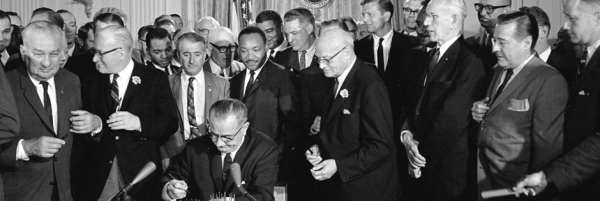From NPR: Behind the Civil Rights Act

President Lyndon Baines Johnson signs Civil Rights Bill, July 2, 2014. Photo via the LBJ Library.
This past week we marked the 50th anniversary of the signing of the Civil Rights Act of 1964. It was landmark legislation in so many ways, touching virtually every arena of life in the United States at that time. While the civil rights movement of the ’50s and ’60s largely played out on southern soil–in Mississippi and Alabama and Tennessee–the legislation reached into discriminatory practices in every state of the union.

A few months prior to the passage of the legislation, Martin Luther King, Jr. and Malcolm X met in Washington outside of Congress. Apparently, this was the only time these two leaders met in person. Photo: public domain, via Wikipedia
NPR invited observers, scholars and writers to de-construct the Civil Rights Act to help us understand what life was like in 1964, how the Act impacted our political, cultural and social infrastructure, and how all of this relates to life in the United States 50 years later.
Behind the Civil Rights Act is an amazing resource featuring Nina Totenberg, NPR Legal Affairs Correspondent; Barbara R. Arnwine, President, Lawyers’ Committee for Civil Rights Under Law; Nikole Hannah-Jones, Reporter, Pro-Publica; Clay Rise, author of “The Bill of the Century,” and half a dozen other participants.
There is so much content at the site–photographs, legislative language, essays. It’s all usable on your tablet, smartphone, laptop or desktop. It’s interactive and beautifully put together.
I can’t think of a better resource to share with you on this July 4th weekend, 50 years after this legislation became law of the land. I remember the day, vividly. It was a brutal summer: Medgar Evers, an NAACP leader in the South, was murdered, as were three voter registration civil rights workers. Behind the Civil Rights Act brings it all back–and forward into present times–and provides a level of understanding that is worth your time.
Happy July 4th. We can be proud of this piece of our history.
Tags: civil rights, civil rights act, NPR








The various civil rights laws of the 1960s would not have passed if not for the votes for Republicans. And now “modern” Republicans want to dismantle them all.